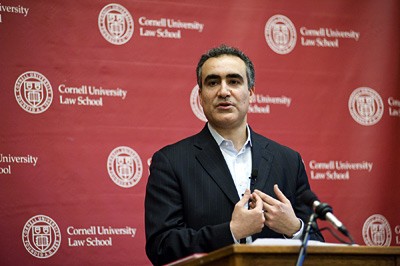Amnesty International leader criticizes legal system for human rights abuses in Iraq
By Zheng Yang
When British, American and other coalition forces invaded Iraq in 2003, the "United States and Britain were utterly unprepared for their obligations," to keep local residents safe, as mandated by international law for occupying powers, said Saman Zia-Zarifi '90, J.D. '93, director of Amnesty International for Asia.
In his April 22 talk, "Counter Terror with Justice: The Dispatches of Terror and the Axis of Evil," at the Cornell Law School," Zia-Zarifi discussed his experience as an international lawyer and human rights activist working in Iraq and Afghanistan, both shortly after Sept. 11, 2001 and after the invasion of Iraq.
Presenting images of mass graves and looted buildings in Iraq as well as unexploded ammunition and cluster bombs in Afghanistan, Zia-Zarifi discussed the insufficiency of "state-centric" international law and human rights law in holding non-state actors accountable for human rights violation.
"The laws are starting to run out of [legal solutions for] the problems we identify," he said. "The rights of individuals are being violated, but it's no longer clear who is going to be held accountable for the violations."
Zia-Zarifi also commented on the "tremendous lack of trust" among Afghan people toward the old warlords who assisted American troops in fighting the Taliban. "Under the warlords, women do not have access to health care, and they cannot go to work or go to school," said Zia-Zarifi, "The future generation of teachers and nurses is no longer there in Afghanistan."
When asked about his opinion towards the mass media, Zia-Zarifi recognized that it is getting more difficult to "put your issues in front of people," given the volume of information promoted in the current media environment. To some extent, however, he noted that human rights organizations have become major news media's competitors because "people come directly to our Web sites to see what we are saying."
Zia-Zarifi said the 9/11 terrorist attack was a life-changing moment for him, particularly because of his Iranian roots. He encouraged Cornell students committed to work in human rights organizations to master a foreign language, study abroad, while maintaining high academic record because these organizations "have become quite elitist."
Graduate student Zheng Yang is a writer intern at the Cornell Chronicle.
Media Contact
Get Cornell news delivered right to your inbox.
Subscribe